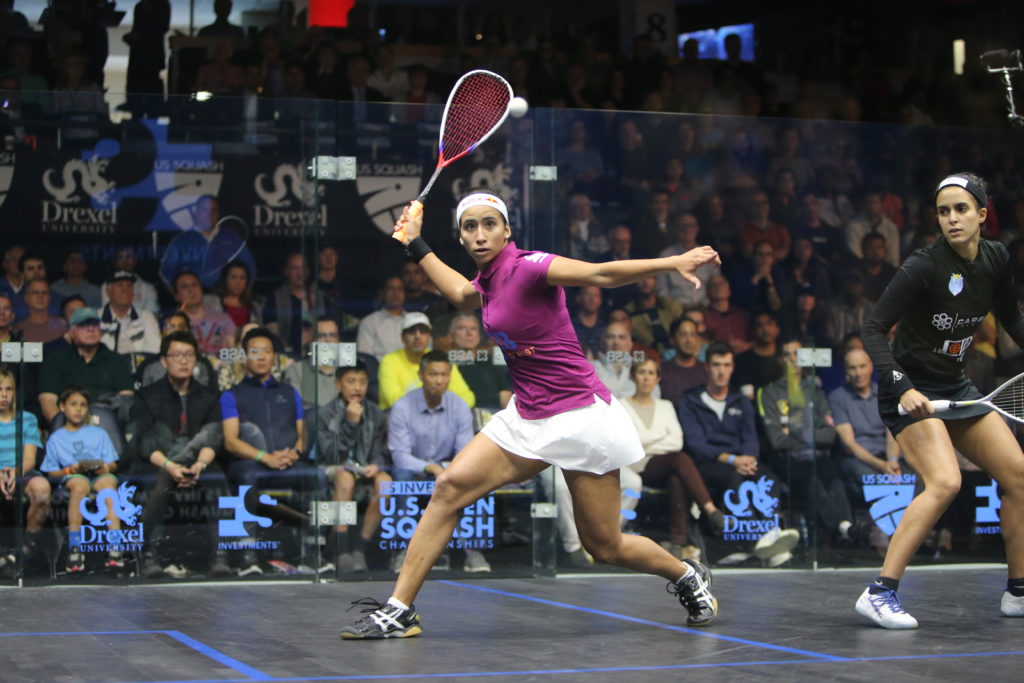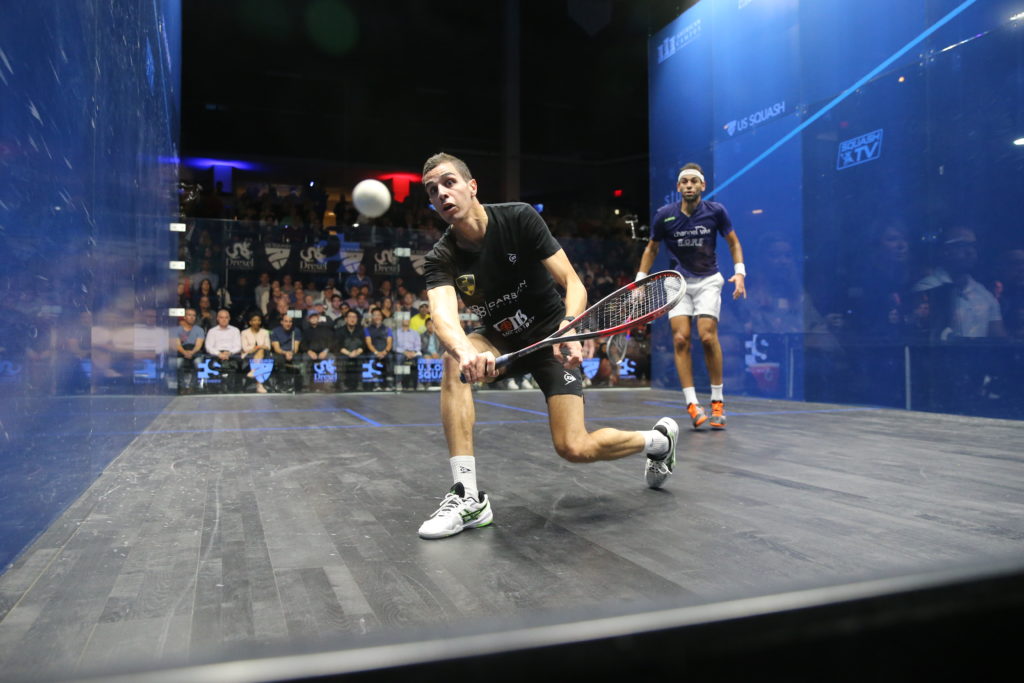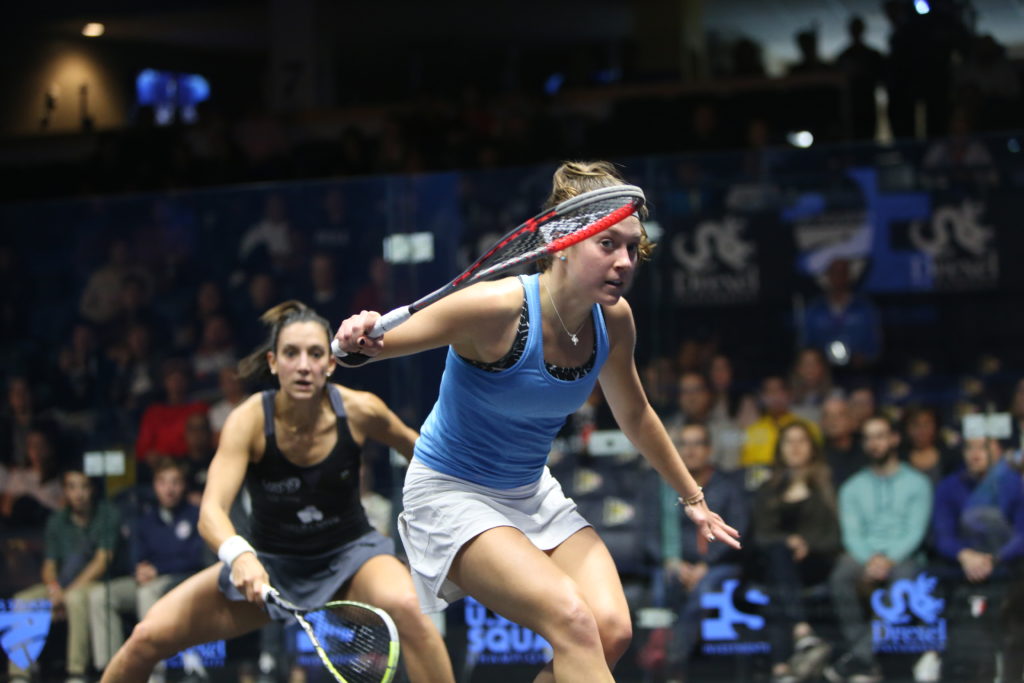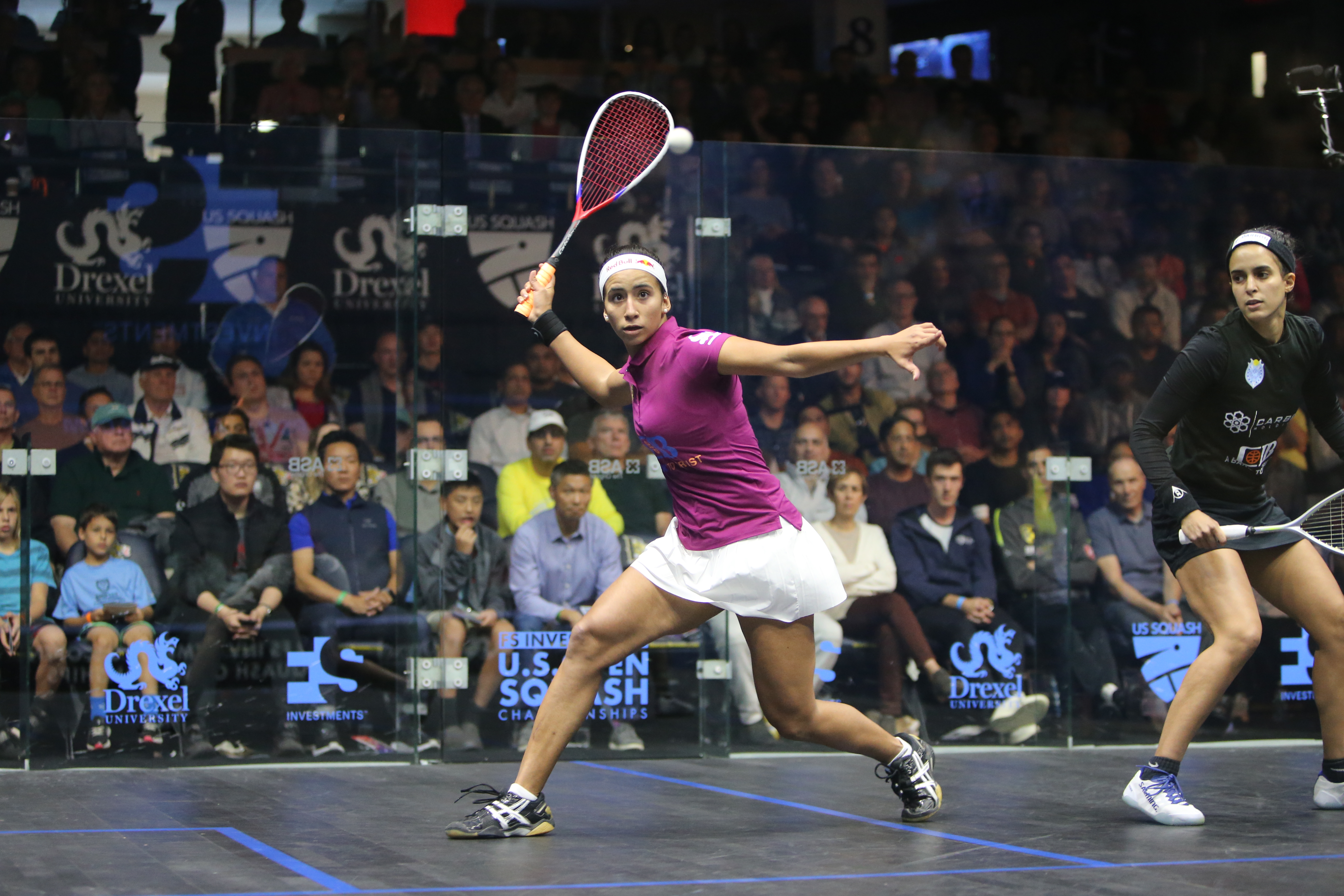The finals of the 2019 FS Investments U.S. Open came within a half-inch of duplicating the 2017 edition, with the wife and husband team of Nour El Tayeb & Ali Farag again almost pulling off the historic double of a married couple winning the same title on the same day.
El Tayeb, dubbed the Black Widow, comfortably wove a web of deception and feathery flicks to a 2-0 lead against Nouran Gohar. But in the third game, she stiffened. She seemed to lose zip and was late on the ball. Gohar began to alternate her paint-peeling, blistering drives with some clever shot-making—especially her backhand boast. Still, El Tayeb, after saving a game ball at 10-9, had a match ball up 11-10. It was not to be. Gohar calmly sank a backhand straight drop off a loose chip by El Tayeb. Gohar squandered a second game ball. Gohar then seized the seventeen-minute game 14-12. Suddenly she had life.
Gohar shouldn’t have been surprised, but she was. The twenty-two-year-old Egyptian had been nipping at the heels of the Egyptian Trio—El Tayeb, Raneem El Welily and Nour El Sherbini—that has absolutely dominated women’s squash recently; the three had captured all but one platinum event on the PSA tour in 2018 and 2019. Then Gohar ripped through the 2019 British Open in May, beating both El Welily and El Tayeb en route to a breakthrough victory. Her nickname now was the Terminator.

Still, in Philadelphia, the Terminator had deep doubts. The U.S. Open had always been an unlucky tournament. She had been playing at Drexel since she was sixteen but had never gotten out of the quarters. In particular, memories of last year stung. As six seed, Gohar had stumbled in her first match to Yathreb Adel in a bitterly close contest: 15-13, 14-12, 11-13, 6-11, 11-9. Her qualms were such this year that each morning she and her father packed their bags and checked out of their hotel, convinced that they would fly home that night after a loss. Then, after each methodical Gohar victory—she lost just a single game before the final—they rebooked their flights and checked back in.
El Tayeb was a tough nemesis for Gohar: El Tayeb had beaten her in the final of the Egyptian nationals in February and then crushed her in less than a half hour in the semis of the China Open a month earlier. Adding to the challenge, Gohar, a civil engineering student in her last year at American University of Cairo, was busy taking a mid-term exam on the morning of U.S. Open final.
After saving match ball, Gohar ran roughshod over a venom-less El Tayeb. “In the first two games, I felt like I was doing court sprints,” Gohar said afterwards. “It was like a pressure session and my legs were burning. I had to dig in. Then in the third game I just said to focus on this game, on getting eleven points.” The last two games were tight—El Tayeb sprinted to a 5-1 lead in the fourth and looked ready to clinch the championship. One rally, at 7-all in the fourth game, prompted a standing ovation from the thousand-plus fans at the Daskalakis Athletic Center. El Tayeb was on the defensive, her flair suddenly no match for the frozen-rope rails of Gohar.
It feels that Gohar has been around the game forever—this was her seventh appearance at the U.S. Open and she talked after her victory about being so awestruck at her first visit in 2013 that she took photos of Karim Darwish—but she is only twenty-two and the victory made her the youngest champion since the event was founded in 1954, supplanting Mark Talbott in 1983 by a few months.
On the men’s side, Ali Farag, world No. 1, fulfilled his side of the matrimonial Open championship bargain with a comprehensive victory over Mohamed ElShorbagy.
If there was ever a squash Rorschach inkblot of Farag v. ElShorbagy, the two Egyptians would elicit every possible reaction. Their styles, their personalities, their tactics, their stories—they are remarkably different yet both are destined for all-time greatness. In the past two years, they have distinctly separated themselves from the rest of the PSA pack. In ranking points, they are both above 1,800 and more than 500 points from the players below them. Might as well be 500 miles.
They are always seeded one and two. According to SquashInfo.com, they’ve played each other a remarkable eleven times in a tournament final since the 2017 U.S. Open; Farag has won five of those matches; ElShorbagy has six.
Currently Farag v. ElShorbagy is the defining rivalry on the men’s tour. With both coming into their primes, it could very easily evolve into one of the great rivalries of the game. It will be interesting in terms of the tread on the tires: ElShorbaby, twenty-eight, had played 533 PSA matches after the finish of the U.S. Open, while Farag, less than a year younger, was at just 288.

If they become a classic two-some, this year’s Open will not be considered one of their greatest matches. The last time Farag beat ElShorbagy in a three-game final was the 2017 U.S. Open, but there each game was taut—12-10, 11-9, 11-8. Here the tension never built up, as Farag sailed smoothly to a forty-minute victory winning thirty-three points and losing just thirteen. Every game had a couple of stupendously long rallies—a hundred strokes, crazy gets—and Farag would take the point.
At Drexel, Farag had fresh legs. He played three-gamers on Sunday and Monday and then had a unique four-day break—because of rest days and Miguel Angel Rodriguez’s withdrawal—before he again played in the semis on Friday. To reach the final he had spent just 125 minutes on court, while ElShorbagy had logged 214.
Furthermore, Farag feels at home in the U.S. He spent four years at Harvard and has many local friends and supporters. Four of his wins in finals against ElShorbagy have happened in the States. After his latest win, he pointed to Mike Way, his college coach, as the difference. “I’m in my comfort zone when Mike is around,” Farag said.
ElShorbagy also had his American-based coach on hand: Rod Martin, the two-time U.S. Open champion. After the match, Martin promised month-long training sojourns throughout the season, as ElShorbagy tries to get back to world No. 1
The 47th Open saw a number of remarkable early-round results.
For the men, Campbell Grayson, recently relocated from New York to Boston, outlasted Princeton’s Youssef Soliman in a two-hour tussle, then knocked out Andrew Douglas before going down to ElShorbagy. Zahed Salem dispatched Marwan ElShorbagy and then made Simon Rösner spend an hour on court before departing; Rösner had his nine-month-old son Liam in tow—Liam was quite talkative during his father’s matches. Diego Elias, fresh off his seminal Pan Am Games victory, had his best-ever Open run: he topped three very tough opponents: George Parker, Joel Makin and Karim Abdel Gawad on his way to becoming the first South American to reach the semis of the Open.
For the women, Low Wee Wern made her first appearance at the Open in three years and won a match, while Rachael Grinham made her eleventh career appearance at the Open and won one match before departing. Rowan Elaraby, the 2018 world junior champion, took three matches, including saving two match balls to overcome Joelle King and reach her first-ever platinum quarters. The talk of the draw early on might have been Sivasangari Subramaniam, the young Malaysian who is a sophomore at Cornell. In her Open debut, she outlasted Coline Aumard 11-9 in the fifth, then knocked out Alison Waters in four before going down to Sarah-Jane Perry 10-12, 11-9, 11-6, 14-12.

on the Open by beating Mayar
Hany, ranked twenty-eight spots
higher than her, before losing
to Camille Serme in the second
round.
Team USA did something unprecedented in the past three decades: five Americans won a match at the Open. The two wild cards, Sabrina Sobhy and Andrew Douglas, took their first matches by upsetting higher-ranked opponents. Olivia Blatchford Clyne snagged one victory and then pushed Joelle King to four. Olivia Fiechter, with her coach, four-time Open champion Peter Nicol, in her corner, surprised Emily Whitlock. Amanda Sobhy, despite a leg injury, bagged two matches: it was the fourth time she has made at least the quarters at the Open. Only Haley Mendez and Spencer Lovejoy failed to produce a Team USA win but not for the lack of trying—Mendez came within a whisker of pushing aside Rachael Grinham, losing 13-11 in the fifth after saving five match balls; and Lovejoy played admirably in three games against Mazen Hesham.
When the U.S. Open moves over the forty-second walk across Drexel’s campus from the Daskalaskis Athletic Center to the Armory, where Team USA will finally have a full-time base of operations at the Arlen Specter US Squash Center, one can only assume that more victories will come.





